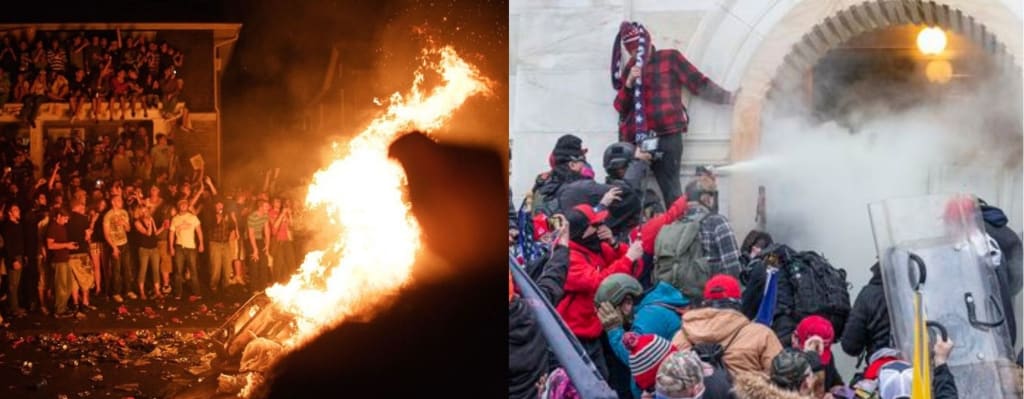January 6th was not an "insurrection"
Don't believe it? Read on.

January 6th was not an “insurrection.” Nor was it a “coup”—or, if you prefer a more positive spin, an “uprising” led by Trump supporters. January 6th was a tantrum.
Just because it was a mass tantrum on the part of a mob doesn’t make it any less so. Anyone who thinks January 6 was an “insurrection”—a serious attempt to seize power—is unfamiliar with the phenomenon of mobs of privileged people throwing mass tantrums because someone told them “no,” or because they found out the law applies to them. If you’ve never witnessed this behavior, maybe you haven’t spent much time around the entitled class. These people never expect to be on the losing side of anything, and when they are, they lash out.
Unlike groups attempting a real coup, mass tantrum-throwers often have no goals in mind. They know they have no real grievances to rally around. Creating chaos is the goal. Like insolent children, they assert their power by slinging shit around and making other people clean it up. The fact that someone—whether it’s the Capitol janitors or a gutless, exhausted parent—will be forced to take care of their messes, and shoulder the consequences, is part of the fun.
Collegiate tantrums are a great example of this, and I’ve witnessed several of them. I was a student at Ohio University between 2004 and 2009. OU is known for its picturesque, hilly campus and stately brick dormitories crawling with ivy. While it wasn’t the case for everyone, these students were mostly children of privilege. My school was known for its party-hearty atmosphere and its various “fests.” Palmerfest 2009 at OU was a particular shitshow.
Like a lot of college “fests,” there was underage drinking, but that wasn’t the problem. By nightfall, after eight solid hours of imbibing, fights would break out and people started getting injured. At that point, the local police from the town of Athens arrived to get the crowd under control—which the drunken 20-year-olds didn’t like one bit. There was definitely a “who do you think you are” mentality among the students toward police, and a clash followed.
Like the Capitol riot, it started with bratty, obnoxious antics, like name-calling and impotent threats. Students made a show of dashing across the street, as if it were all a big game of Red Rover, despite the cops’ order to stay on the lawn.
As it became clear the students could not make the police go away, they turned in an instant to mass violence and property destruction. People began throwing glass bottles, ripping stop signs out of the ground, assaulting cops en masse, and starting fires for no apparent reason. Luckily, no one died—but the students probably would have kept going even if someone had.
As a longtime columnist for the campus newspaper, I suggested the city shut down Palmerfest before someone got killed. The possibilities were endless, whether it was a massive house fire or a roof collapsing because a hundred people were sitting on it. The freshmen and sophomores didn’t like this suggestion at all, reacting as if I were an old church lady scolding the kids for their rowdy night.
The next year, someone set fire to a packed house on Palmer Street in a senseless arson. Fortunately, the long-suffering city police cleared the property without any injuries or deaths. But I had been proven right, and this was far from a harmless little prank. I knew firsthand how dangerous petty arson is: in 2005, my older sister’s close friend Julie died in an off-campus house fire at Miami University in Oxford, Ohio. True to a poorly maintained, rickety old house in a college town, the whole place went up in flames within five minutes. The frat boys living there bailed out of windows, leaving behind the girls they’d enticed to spend the night, where they died of smoke inhalation. The bodies were burned beyond recognition, and the charred bones had to be identified with old dental X-rays. The cause of this deadly fire? Unattended cigarettes dropped on the floor—or petty arson, committed by people who thought it was funny and harmless. Ten years later, having learned nothing, another fraternity house at Miami was burned to the ground in another arson.
Did I mention Miami University is known, even more so than OU, for its glamorous, wealthy students and materialistic Greek life culture? It shouldn’t surprise you by now. Brazen lawbreaking often stems from a place of entitlement, committed by people who think they won’t get caught, and who have the money and connections to sweep it under the rug when they are. They are as surprised as everyone else when this mentality catches up with them, often in a dramatic, tragic climax.
I saw all of this in the video footage from January 6th. The Capitol rioters thought it was fun and games to smash windows because they lost an election. While I doubt anyone was serious about “hanging Mike Pence,” the Secret Service takes these threats quite seriously. People who grew up facing consequences for their actions know it’s a terrible idea to play chicken with the Vice President’s Secret Service detail. The privileged rioters, on the other hand, did not know this, and continued hammering away at a window as an agent trained a gun on them.
But when the agent actually fired his weapon, these cowards ducked—allowing the woman behind them, Ashli Babbit, to take a bullet to the neck. When cable hosts started mocking the rioters as poor hillbillies who eat at Red Lobster, I knew they were way off the mark.
As the FBI began arresting the rioters, the truth emerged: they were not poor hillbillies. Far from it. In fact, more than one had flown to DC on a private jet. Many were business owners and executives, educated and wealthy people who calmy walked away from the Capitol and returned to four-star hotels. Like all mass tantrum-throwers, they were shameless, bragging about their exploits on social media—until the FBI started arresting them.
Now, their lawyers argue that they are victims. They’re being scapegoated by overzealous prosecutors; the blame clearly lies with Trump himself, who incited them. Some pundits, including Ann Coulter, have downplayed January 6th, arguing that the rioters committed minor crimes worthy of no more than a citation, such as trespassing and disorderly conduct.
I’m not so sure. After all, five people are dead—including Trump supporter and war veteran Ashli Babbitt, who would be alive today if it weren’t for the brazen fools smashing windows in full view of the Secret Service. Maybe these individuals—and society—would benefit if they had to take ownership of their actions for once. Only a lifetime of being shielded from consequences, combined with a toxic sense of entitlement, could lead people to think they could just walk away from this riot unscathed.
As my colleagues who grew up with less would say: They gon’ learn today.
About the Creator
Ashley Herzog
If you like my work, feel free to tip your writer.






Comments
There are no comments for this story
Be the first to respond and start the conversation.